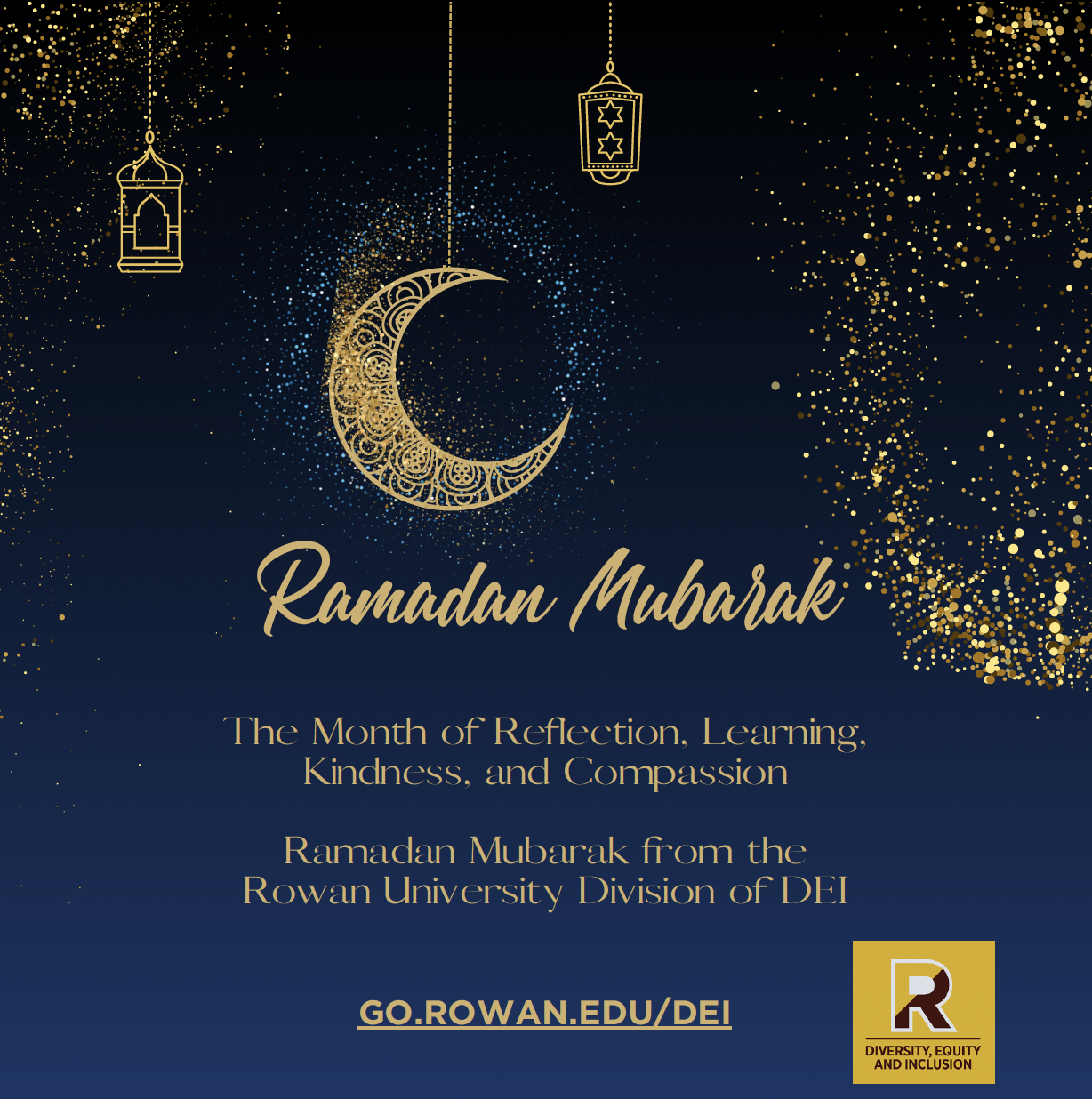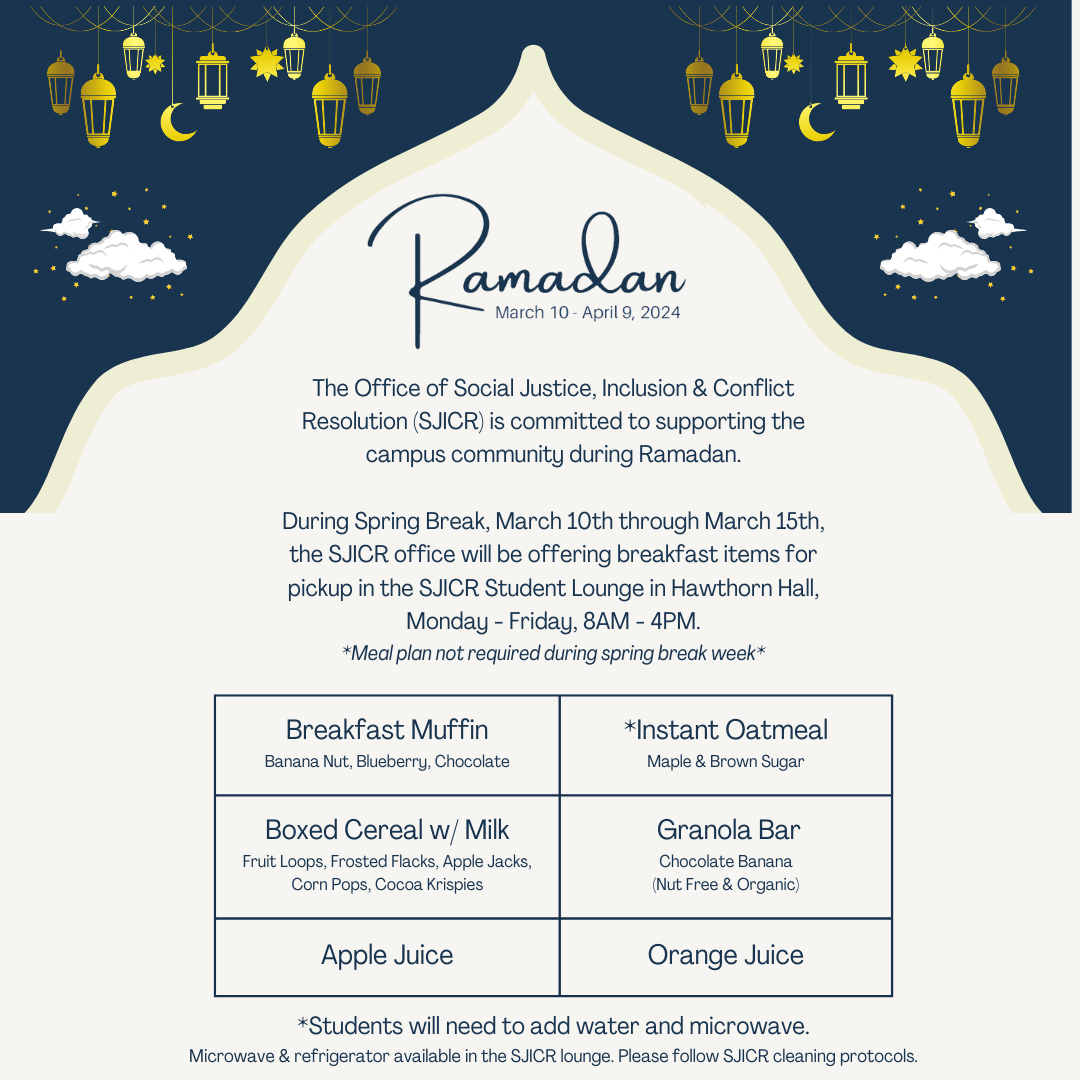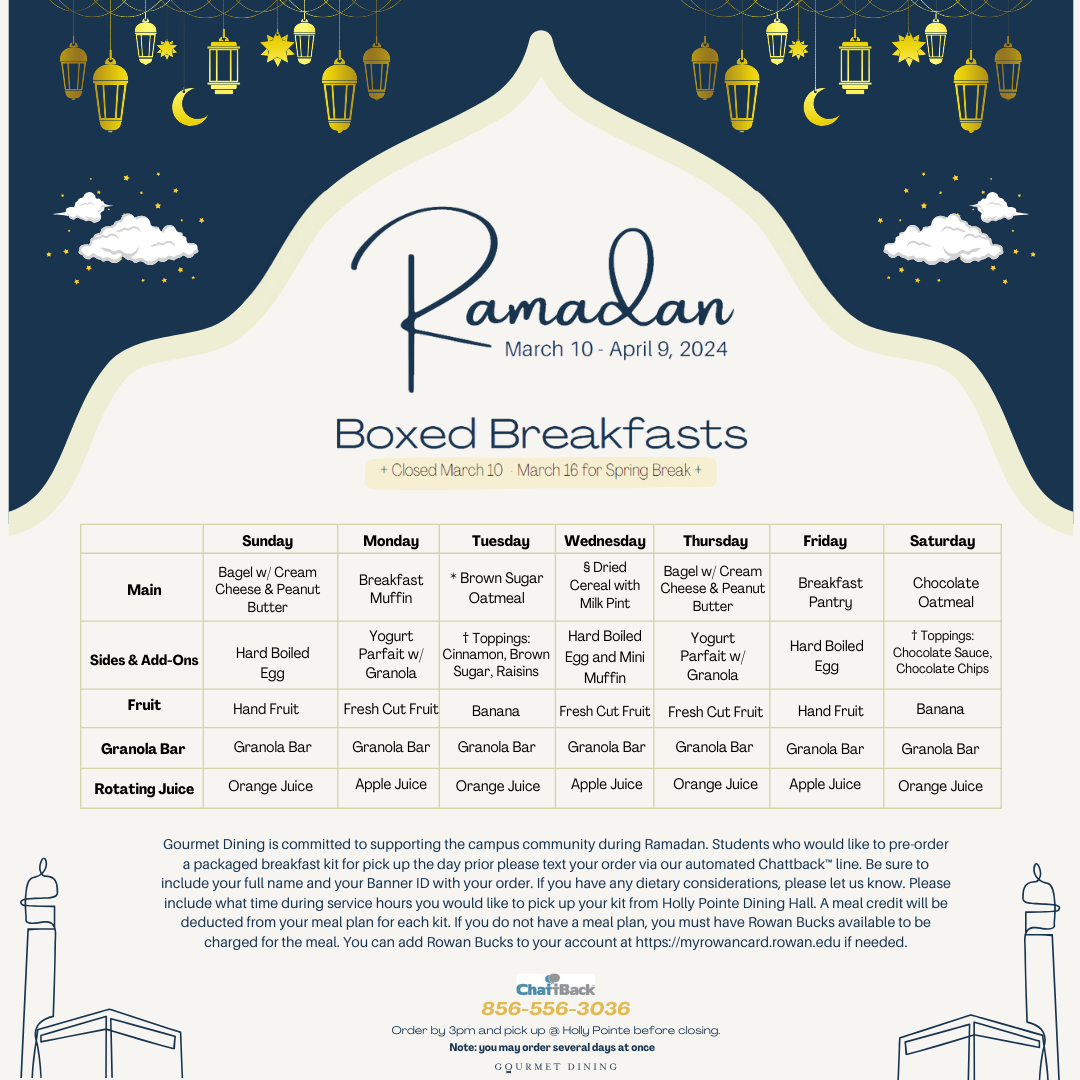
Image Alternative Text: Depicted are a crescent moon with loop-like and flower patterns, and lanterns with stars, in shades of gold. The crescent moon is symbolic of progress; and the stars, light. Bursts of glitter are depicted in the top left, center, and top right corners of the graphic, in shades of gold and turquoise. The background is gradient, in shades of dark blue.
The text at the center of the graphic reads, "Ramadan Mubarak;" "The Month of Reflection, Learning, Kindness, and Compassion;" and "Ramadan Mubarak from the Rowan University Division of DEI;" along with the website link to "go.rowan.edu/dei." The Rowan University Division of Diversity, Equity, and Inclusion (DEI) logo is positioned towards the bottom right corner of the graphic.
Click here to download and share the graphic.
This article was written for the Rowan University community at large by Patricia Fortunato (fortun83@rowan.edu); with contribution from Dom Pierson, who included the section covering specific guidelines for accommodating Rowan University students and Office of Social Justice, Inclusion, and Conflict Resolution (SJICR) campus resources. For inquiries in regard to SJICR resources, please email socialjustice@rowan.edu.
Contents were developed with gratitude to loved ones/families; students, academic faculty, and staff; and the entire Division of Diversity, Equity, and Inclusion (DEI) team and DEI Council. At the Division of DEI, we strive to support one another and all Rowan University communities who observe Ramadan.
Follow the Rowan University Division of DEI:
- Instagram: instagram.com/rowandei
- Facebook: facebook.com/rowandei
- X/Twitter: twitter.com/rowandei
- Threads: threads.net/@rowandei
Brief History of Ramadan
The term Ramadan originates from the Arabic root word, ar–ramad, meaning "scorching heat." Muslim communities believe that in A.D. 610, the angel Gabriel appeared to Prophet Muhammad and revealed the Islamic holy book, the Qur'an.1 This event on the 27th evening of the observance is known as Laylat–al–Qadr, "Night of Power," also sometimes referred to as "Night of Decree."2 During Ramadan, communities fast to commemorate this revelation of the Qur'an.3
Ramadan is the ninth month of the Hijri calendar, also known as the Islamic calendar, or Muslim calendar.4 It is considered the most sacred month in Islam. The beginning of the observance varies per year, based on the lunar Islamic calendar, which follows the moon's phases and begins on the date following the new crescent moon's appearance. The crescent moon can be difficult to discern.5 Thus, if the moon isn't visible due to weather conditions, lunar calculations are used to predict its presence.6
Observing Prayers and Fasts
During Ramadan, Muslim communities strive to grow spiritually and nurture relationships with Allah, by praying, reciting the Qur'an, and demonstrating increased intentionality and altruism. It is also important to note that among the "Five Pillars of Islam," further outlined below, beliefs center on altruism and caring for others.7
Throughout the observance, fasting from all food and drink, including water, is observed between sunrise and sunset among Muslim communities.* Individuals who do not observe fasting are people who are menstruating, experiencing postnatal bleeding, experiencing illness, or traveling, and special populations (pregnant people, and older adults/geriatric population). Days missed fasting can be applied to the remainder of the year. Fasting is considered a private act, a form of spiritual discipline, and a way to empathize with people experiencing hardship.
*Some individuals who identify as Muslim will observe fasting or prayer, instead of both.
Breakfast, suhoor, occurs pre-dawn and prior to the first prayer of the day. The evening meal, iftar, occurs after sunset prayer, Maghrib, is finished. Taking heed from Prophet Mohammad and his breaking fast with dates and water, Muslim communities eat dates during both suhoor and iftar periods.8 Dates are considered a staple food in the Middle East and North Africa (MENA)9 and provide sugar after a period of fasting. Meals during Ramadan are an opportunity for Muslim communities to gather, engage, and support one another.
Also during the observance, Muslim communities pray several hours per day. In addition to salah, the five daily prayers centric to the core of Islam,10 a special prayer called Tarawih, night prayer, is recited.
Following the final date of Ramadan, Muslim communities celebrate Eid al–Fitr, known as "Festival of Breaking the Fast," which begins with communal prayers at daybreak. During these three or four days of festivities, participants gather to pray, enjoy meals, and exchange gifts.11
Across the 2022 to 2023 academic year, more than 30 public school districts in New Jersey closed in observance of Eid al–Fitr, with additional districts joining for the 2023 to 2024 academic year, driven by advocacy support from the Council on American–Islamic Relations in New Jersey (CAIR–NJ).12
The "Five Pillars of Islam" Are Core Beliefs of Islam
- Shahada (Profession of Faith): This pillar focuses on the belief central to Islam, "There is no god but God, and Muhammad is the Messenger of God."
- Salat, or Salah (Prayer): This pillar focuses on praying while facing Mecca five times per day at dawn, noon, mid-afternoon, sunset, and after dark.
- Zakat (Alms): This pillar involves donating a portion of income to Muslim community members who are experiencing hardship.
- Sawm (Fasting): This pillar focuses on aforementioned fasting from food and drink. Through this act, individuals who identify as Muslim strive to renew awareness of and gratitude for all that Allah has provided them, and cultivate deeper empathy for all experiencing hardship.
- Hajj (Pilgrimage): Muslim community members strive to travel at least once to the holy city of Mecca, in present-day Saudi Arabia, if personal finances and health allow it.
Honoring Ramadan 2024
As mentioned, the beginning of Ramadan varies per year, based on the lunar Islamic calendar. This year, the first day of fasting during the observance is projected to be March 11 or March 12, 2024;5 however, this date may vary among Muslim communities and Islamic schools and branches. Similarly, Eid al–Fitr is projected around April 10, 2024; however, it may be observed on differing dates per interpretive and/or cultural preferences. It may be common for some individuals who identify as Muslim to break fast after sundown, and others to delay breaking fast.
Individuals who identify as Muslim may or may not be comfortable sharing whether or not they are fasting. Further, reasons for not fasting are personal information. Cultural practices are also sometimes personal and varying in shaping how Ramadan is observed among individuals who identify as Muslim. While reasons, practices, and experiences are individualized, it is important to note that in a health emergency, it is absolutely acceptable to break a fast.
Supporting Students and Colleagues at Rowan University
Some individuals who identify as Muslim and who are fasting will not change day-to-day routines. Athletes and individuals who practice fitness may still maintain exercise routines while fasting. However, some individuals may experience challenges due to the mental and physical demands of fasting.
Academic faculty and supervising staff should anticipate a range of accommodation requests for students and team members, and should strive to foster inclusive classroom and workplace environments while demonstrating compassion for all.
Specific guidelines for accommodating students at Rowan University are provided below.
From the Office of Social Justice, Inclusion, and Conflict Resolution
For academic faculty and staff at Rowan University, outlined below are some best practices for creating a welcoming environment that allows our Muslim students to feel fully supported, including specific guidelines for accommodations:
- During Ramadan, make any class materials available virtually in an asynchronous format so that students can remain caught up, should they miss content due to spiritual practices.
- Offer an asynchronous option for classes and meetings during the breaking of the fast at sunset.
- Offer students the opportunity to meet during regular or extended office hours in order to stay current with course materials and content.
- Avoid scheduling meetings or events with student groups after sunset.
- Include information about the religious observances policy on syllabi.
- Be aware of private spaces where students can go to pray near your location or share the prayer space locations we have on campus, Hawthorn 202 and Savitz 218.
Most importantly, talk to your students about how you can support and advocate for them during Ramadan and beyond.
While Muslims are expected to meet their daily schedule obligations for school and work, some accommodations are needed to be able to be successful while fully engaged in various aspects of Ramadan. Students may reach out to faculty to request religious accommodations during Ramadan. Accommodations could include moving the time of an exam and/or allowing more time so they can schedule it around suhoor, iftar, prayer, etc. Some students may prefer to take an exam earlier in the day when they feel more energized, while others would rather take it at night.
Students should also have accommodations on Eid–al–Fitr (evening of April 9 through evening of April 10, 2024). This is a time for celebration after a month-long fasting. Students should be excused from their regular schedules on that day, including taking any exams and attending class.
Support will allow students to fulfill the requirements of the class while being spiritually engaged in the rituals of the month.
Interfaith, Prayer, and Meditation Space at Rowan University
The interfaith, prayer, and meditation room located in Savitz Hall, Second Floor, Room 218, will be reserved every day beginning March 10 through April 9, 2024, from 9:30pm to 11pm. Signage will be posted outside of the room. For more information regarding guidelines and usage of the space, please review the Rowan University Interfaith, Prayer, and Meditation Space Policy.
Student Dining Options on the Glassboro Campus

During spring break (March 11 through March 15, 2024), SJICR will provide breakfast items for pick up in the Student Lounge in Hawthorn Hall, Monday through Friday, 8am to 4pm. A meal plan is not required during spring break week in order to pick up these items. Please view the menu above and here.

During the timeframe of March 18 through April 9, 2024, Gourmet Dining will provide packaged breakfast kits for pick up, available via pre-order the day prior. Students can text their order via the automated Chattback™ line, being sure to include full name, Banner ID, and dietary restrictions with each order. Students should also include their preferred time during service hours for pick up from Holly Pointe Dining Hall.
A meal credit will be deducted from the meal plan for each kit. Students who do not have meal plans must have Rowan Bucks available to be charged for the meal. Rowan Bucks can be added at this link. Please view the menu above and here.
*Students who would like to store and/or heat up their meal can do so in the main lounge of SJICR located in Hawthorn Hall, Second Floor.
*SJICR offers a resources and support guide for the Rowan University community. Please refer to this guide for information regarding cultural and identity-based organizations; interfaith and spiritual support; mental health services for students and employees; and other Rowan-based and external resources.
Resources for Continued Learning from the Division of DEI
At the Division of DEI, during Ramadan and year-round, our entire team remains committed to promoting increased cultural appreciation, fostering increased inclusion, and celebrating the Muslim community.13 Together we strive to continue advancing intentional inclusion, compassion, and understanding.14
We invite the Rowan University community to review and use our resources for inclusive communications and continued learning, provided below.
Terms and Guidance for Inclusive Communications
- Cultural Appropriation: This term refers to taking and benefiting from the expression, ideas, artifacts, etc. of another culture without permission, often done by the dominant culture. This is not a cultural exchange, which requires mutual consent and respect.
- Immigrant: An immigrant is an individual who moves to another country, usually for permanent residence. They may or may not be citizens. The terms "foreigner," "illegal immigrant," and "alien" are offensive and should not be used as synonyms.
- Institutional Racism: Institutional racism is the ways in which structures, systems, policies, and procedures of institutions are founded upon and then promote, reproduce, and perpetuate advantages for the dominant group and the oppression of disadvantaged and underrepresented groups.
- International: This is the appropriate term to use for students who obtain a non-immigrant visa, such as a student visa or an exchange visitor visa.
- Intersectionality: This is a theoretical concept describing the interconnection of oppressive institutions and identities. The term was conceived in 1989 by Kimberlé Crenshaw, civil rights advocate and scholar of critical race theory.15
- Islamophobia: This is a form of bigotry, hostility, and discrimination targeted at individuals who identify as Muslim, and more generally those perceived as Arabs.
- Muslim: An individual who identifies as Muslim identifies with the religion of Islam.
- Muslim World: There are an estimated 1.9 billion Muslims in the world, per projections via the Pew Research Center.16 Indonesia is home to the world's largest Muslim population, with an estimated 87% of the country identifying as Muslim.17
- Racism: Racism is prejudice, discrimination, or antagonism directed toward someone of a different race based on the belief that one's own race is superior. Racism involves one group having the power to carry out systematic discrimination through the institutional policies and practices of society, and by shaping the cultural beliefs and values that support those racist policies and practices.
- Refugee: A refugee is a person forced to flee their country due to persecution and/or violence. The term "migrant" may be offensive in some contexts.
- Xenophobia: Xenophobia is a fear or hatred of foreign-born individuals.
Other Resources for Continued Learning
Educational Websites:
- New Jersey Muslim Heritage Month Coalition (NJMHM): The NJMHM seeks to engage, collaborate, and build respect, striving towards a future of recognition, celebration, and integration of Muslim communities in the state. Learn more here.
- American Muslims: A History Revealed: "American Muslims" is a documentary film series that covers the history of Muslim individuals in the United States—from migration to diverse communities across the U.S. in present-day. The first of the six films is set to be released next month via Public Broadcasting Service (PBS) Digital Series (learn more here). The project website offers an illustrative timeline of events, covering 500 years of history centering on the stories of American Muslim individuals (learn more here).
Curricula and Toolkits:
- New Jersey Islamic Networks Group (NJ ING): The NJ ING seeks to promote religious tolerance and foster understanding of Islam and other religions, including Judaism, Christianity, Buddhism, and Hinduism, via trainings and interfaith panel discussions to middle and high schools, colleges/universities, faith-based organizations, and public libraries. Learn more here.
- Muslim American Heritage Celebration, part of the Muslim American Leadership Alliance (MALA): The Muslim American Heritage Celebration offers curricula focused on an introduction to diverse Muslim experiences in the United States. Learn more here.
- Institute for Social Policy and Understanding (ISPU) Educators Toolkit: The ISPU offers evidence-based resources to support all educators in fostering safe learning environments for all students, with focus on those who identify as Muslim. Learn more here.
Rowan University Community of Support for Students
Current and interested students who identify as Muslim at Rowan University are invited to join the following student-run groups:
- American Muslim Medical Student Association (AMMSA) at Rowan–Virtua School of Osteopathic Medicine (Rowan–Virtua SOM)
- Muslim Medical Student Association (MMSA) at Cooper Medical School of Rowan University (CMSRU)
Additional student groups at Rowan University that may be of interest include:
- Asian Pacific American Medical Student Association (APAMSA) at Rowan–Virtua SOM
- APAMSA at CMSRU
- Black, Indigenous, and People of Color (BIPOC) Graduate and Professional Student Association (BGPSA)
References
- The Met Learning Resources. The Qur'an. The Metropolitan Museum of Art. Retrieved from metmuseum.org/learn/educators/curriculum-resources/art-of-the-islamic-world/unit-one/the-quran on March 6, 2024.
- Osman, N. (2021). Laylat al–Qadr: The Holiest Night in Islam Explained. Middle East Eye.
- Inskeep, S., & Fadel, L. (Hosts). (2023). Muslims Begin Fasting from Dawn to Dusk for Ramadan. National Public Radio (NPR).
- Osman, N. (2022). The Islamic Calendar: How Does it Work and Why is it Lunar?. Middle East Eye.
- His Majesty's Nautical Almanac Office (HMNAO). (2024). Crescent Moon Visibility for 2024. United Kingdom Hydrographic Office (UKHO). Retrieved from assets.publishing.service.gov.uk/media/65df04c4f1cab30011fc4843/Crescent_Moon_Visibility_for_March_2024.pdf on March 6, 2024.
- Al–Rajab, M., Loucif, S., & Al Risheh, Y. (2023). Predicting New Crescent Moon Visibility Applying Machine Learning Algorithms. Scientific Reports, 13(1), 6674.
- The Met Learning Resources. The Five Pillars of Islam. The Metropolitan Museum of Art. Retrieved from metmuseum.org/learn/educators/curriculum-resources/art-of-the-islamic-world/unit-one/the-five-pillars-of-islam on March 6, 2024.
- Moskin, J. (2015). During Ramadan, Dates Are a Staple. The New York Times.
- Al–Shwyeh, H. A. (2019). Date Palm (Phoenix Dactylifera L.) Fruit as Potential Antioxidant and Antimicrobial Agents. Journal of Pharmacy & Bioallied Sciences, 11(1), 1.
- The Pluralism Project. Salat: Daily Prayers. Harvard University. Retrieved from pluralism.org/salat-daily-prayers on March 6, 2024.
- The Pluralism Project. Ramadan and Eid al–Fitr. Harvard University. Retrieved from pluralism.org/ramadan-and-eid-al-fitr on March 6, 2024.
- Eid Holiday in Public School. (2024). Eid Holiday Status in New Jersey. Council on American–Islamic Relations in New Jersey (CAIR–NJ). Retrieved from cair-nj.org/eid-holiday on March 6, 2024.
- Fortunato, P. (2024). Recognizing and Celebrating Muslim Heritage Month Year-Round and Increasing Cultural Appreciation. Rowan University. Retrieved from sites.rowan.edu/diversity-equity-inclusion/blog/2024/january/muslim-heritage-month.html on March 6, 2024.
- McPherson–Myers, P., & Koett, K. S. (2023). A Time for Grieving Together. Rowan Today. Rowan University. Retrieved from today.rowan.edu/news/2023/10/a-time-for-grieving-together.html on March 6, 2024.
- Crenshaw, K. (1989). Demarginalizing the Intersection of Race and Sex: A Black Feminist Critique of Antidiscrimination Doctrine, Feminist Theory and Antiracist Politics. University of Chicago Legal Forum: Volume 1989: Issue 1, Article 8. Retrieved from chicagounbound.uchicago.edu/uclf/vol1989/iss1/8 on March 6, 2024.
- Lugo, L., Cooperman, A., O'Connell, E., & Stencel, S. (2011). The Future of the Global Muslim Population. Pew Research Center, USA, 1–209. Retrieved from pewresearch.org/religion/wp-content/uploads/sites/7/2011/01/FutureGlobalMuslimPopulation-WebPDF-Feb10.pdf on March 6, 2024.
- Office of International Religious Freedom (IRF). (2021). 2020 Report on International Religious Freedom: Indonesia. United States Department of State. Retrieved from state.gov/reports/2020-report-on-international-religious-freedom/indonesia on March 6, 2024.